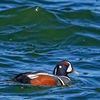Image and lens evaluation
May 20, 2017 16:18:19 #
Depends on the lenses that you compare. Potential advantages of primes include typically lower weight and wider aperture (both for low light and bokeh) - that's what's caused me to add some primes to my collection of zooms - not improvement in IQ.
May 20, 2017 20:11:11 #
Einreb92 wrote:
Question for the forum: Assuming two pictures of a subject was properly framed, exposed etc, and one was taken say at 50mm with a prime lens and the other at 50mm on a zoom lens, would there be a noticeable difference in how the image looks? I am trying to wrap my head around why a prime might be considered "better" except perhaps for maybe being better in low light scenarios.
It depends on which two lenses you are looking at. Sharpness and detail rendition is a consideration, but so is contrast, distortion, chromatic aberration, coma, bokeh, etc etc etc - and still the evaluation could be very subjective.
I have 18 lenses and you won't find a prime 50mm in the bunch. I use a 24-70 F2.8 zoom, and a 45mm F2.8 PC-E to cover that focal length. I don't need an F1.4 lens for low light, so I have no need for one. However, the 24-70 zoom needs to be stopped down to at least F5.6 to get the best out of the lens, and the times I've used a 50 1.4, stopping the lens down to just 2.8 gets you amazing quality and sharpness.
Whether you get a prime or use a zoom will be a personal decision, based on your standard for quality and your shooting needs. What works/doesn't work for me may be completely different for you.
May 20, 2017 22:17:21 #
May 20, 2017 23:14:01 #
mwsilvers
Loc: Central New Jersey
Einreb92 wrote:
Question for the forum: Assuming two pictures of a subject was properly framed, exposed etc, and one was taken say at 50mm with a prime lens and the other at 50mm on a zoom lens, would there be a noticeable difference in how the image looks? I am trying to wrap my head around why a prime might be considered "better" except perhaps for maybe being better in low light scenarios.
Partially depends on the zoom and prime in question, and since fast primes have a wider aperture than most fast zooms, the DoF will be different. Additionally, most lenses tend to be at their sharpest across the frame when stopped down a bit. Good primes are often sharper across the frame than most zooms. It comes down to what I said at the beginning, it depends on which prime and which zoom.
May 21, 2017 00:34:05 #
mwsilvers wrote:
Partially depends on the zoom and prime in question, and since fast primes have a wider aperture than most fast zooms, the DoF will be different. Additionally, most lenses tend to be at their sharpest across the frame when stopped down a bit. Good primes are often sharper across the frame than most zooms. It comes down to what I said at the beginning, it depends on which prime and which zoom.
Tokina 11-20: 2.8 Pro DX; Sigma 17-70: 2.8-4.5., versus a 35 and 50 1.8.
May 21, 2017 01:49:48 #
mwsilvers
Loc: Central New Jersey
Einreb92 wrote:
Tokina 11-20: 2.8 Pro DX; Sigma 17-70: 2.8-4.5., versus a 35 and 50 1.8.
That older Sigma zoom is decent walk around zoom lens, but its probably f/4 at 35mm. A good quality 35mm lens like the Sigma 35mm f/1.4 ART prime will be much sharper across the frame at 35mm, have less distortion, allow in 3 extra stops of light (that's 8 times the amount of light) ,with a much shallower depth of field and better background blur.
May 21, 2017 05:59:10 #
imagemeister wrote:
Speaking only to image quality, and for those living in the past, primes have always been considered to be "better".
For those living in today, many (expensive) zooms equal or surpass most primes.
But as a generalization, most cheaper primes offer more IQ for the buck than cheaper zooms and mostly at wider f-stops.
For those living in today, many (expensive) zooms equal or surpass most primes.
But as a generalization, most cheaper primes offer more IQ for the buck than cheaper zooms and mostly at wider f-stops.

May 21, 2017 06:33:09 #
SS319 wrote:
Noticeable is the question. The prime lens has a ... (show quote)
This is a pretty good answer and why, while I generally use good zoom lenses for convenience, I also carry (and use) a couple of primes. I have 2 main cameras, one a full frame and the other a crop sensor. Both are, what Nikon would call, advanced amateur / entry level professional cameras (D7100 and D610). My zooms are an 10-24mm wide zoom, an 18-70 zoom, a 70-300 zoom (kit lens and not very good) and an 80-400mm lens (really good but slow focusing older lens). My primes are all full frame lenses but can be used on crop sensor or in the crop mode on the full frame. They are a 35mm, 50mm f/1.4, and a 105mm lens. I can use these lenses on both cameras (or on the D610 in DX mode) to get added use/extension.
While primes have their uses, I generally only use them for portraits or similar projects. If I'm in the field, I prefer the advantage of being able to zoom with the lens rather than running toward or away from the subject to get the image I want. With zoom, I can just zoom in or out to frame the shot. If I give up a little resolution, then so be it.
May 21, 2017 06:46:03 #
Einreb92 wrote:
Question for the forum: Assuming two pictures of a subject was properly framed, exposed etc, and one was taken say at 50mm with a prime lens and the other at 50mm on a zoom lens, would there be a noticeable difference in how the image looks? I am trying to wrap my head around why a prime might be considered "better" except perhaps for maybe being better in low light scenarios.
Yes, and I found that surprising. Apparently, 50mm isn't 50mm. Even different zoom lenses show different views at the same focal length. Aside from that, a zoom lens can give the same composition as a 50mm, but you can make the background look different by choosing different focal lengths.
Years ago, it was difficult to make a zoom that was sharp through it's range. Things have gotten better, and zooms can produce excellent quality images. I was unable to find sites that show the difference in view between prime and zoom. I'll keep looking.
http://www.diyphotography.net/zoom-vs-prime-lenses-breaking-two-common-misconceptions/
https://improvephotography.com/1098/prime-or-zoom-lens-dslr/
https://digital-photography-school.com/prime-vs-zoom-lenses-which-are-best/
https://photographylife.com/prime-vs-zoom-lenses/
May 21, 2017 07:13:14 #
May 21, 2017 07:17:40 #
Most expensive prime lenses produce better out of focus background due the the 9 blade rounded aperture blades than their expensive zoom lens counterpart. The lenses that come to mind on this are the Nikon 85mm, 105mm f1.4, 200mm f2 versus the Nikon 70-200mm f2.8.
Einreb92 wrote:
Question for the forum: Assuming two pictures of a subject was properly framed, exposed etc, and one was taken say at 50mm with a prime lens and the other at 50mm on a zoom lens, would there be a noticeable difference in how the image looks? I am trying to wrap my head around why a prime might be considered "better" except perhaps for maybe being better in low light scenarios.
May 21, 2017 08:47:22 #
Robert Bailey
Loc: Canada
www.dxomark.com does scientific testing of lenses mounted on various camera bodies.
The last time I checked, they have tested 11,209 combinations.
Interestingly, the top zoom lens comes in at #262 on the list with a score of 35.
That means the top 261 lenses are all prime lenses with the #1 lens being a Sigma 85 mm with a score of 51.
The last time I checked, they have tested 11,209 combinations.
Interestingly, the top zoom lens comes in at #262 on the list with a score of 35.
That means the top 261 lenses are all prime lenses with the #1 lens being a Sigma 85 mm with a score of 51.
May 21, 2017 09:30:46 #
Einreb92 wrote:
sPeters: Tokina 11-20: 2.8 Pro DX; Sigma 17-70: 2.8-4.5. Both got good reviews across the web. For less $, I could outfit with 35mm and 50mm fast primes. Of course if I could get the right price for a D7200 with 18-140, it would seem a better path to go with the two primes and use the zoom for a walk around lens. Does that make sense?
I'm heading in your direction (D7200 upgrade) I use a 35 prime, have no need for the 50 prime as I bought the 85 and 35 combo from Nikon. Before I came to this board I bought the 18-300 thinking that would be one lens to cover just about everything. Found out most of my shooting is done between 18 and 150 ... and that 18-300 is HEAVY when carried all day. Would have been better served with the 18-140. Just my two cents. Keep reading here and almost all your questions will be answered.
May 21, 2017 10:09:47 #
Take two pictures yourself and examine the pictures. It depends upon what you are taking a picture of. Zoom lens are harder to make than a prime lens, . There are many factors involved. Too many self styled photographers have the notion in their head that a prime lens is old and goes back to the film days. Anyone that argues that a zoom is as good as a prime is wrong. Zooms are slow, working with depth of field is impossible, and while playing zoom, many will miss a shot. Those that have to use a zoom exclusivly are only fooling themselves. I have no zooms and mamage just fine.
May 21, 2017 10:53:01 #
Einreb92 wrote:
Question for the forum: Assuming two pictures of a subject was properly framed, exposed etc, and one was taken say at 50mm with a prime lens and the other at 50mm on a zoom lens, would there be a noticeable difference in how the image looks? I am trying to wrap my head around why a prime might be considered "better" except perhaps for maybe being better in low light scenarios.
As usual, it depends... ON THE LENSES. If the lenses are both recently designed, top-of-the-line pro glass, only minor differences are likely noticeable, at high magnification (large print sizes).
However, zooms used to be awful! Before common use of computer-aided design and engineering, good zooms were hard to find.
Comparing a Nikkor 43-86mm f/3.5 zoom from 50 years ago with its contemporary 50-year-old 50mm f/1.4 would show VERY obvious differences. The 43-86 was arguably the very worst lens Nikon ever made.
http://www.kenrockwell.com/nikon/10-worst.htm
If you want to reply, then register here. Registration is free and your account is created instantly, so you can post right away.







